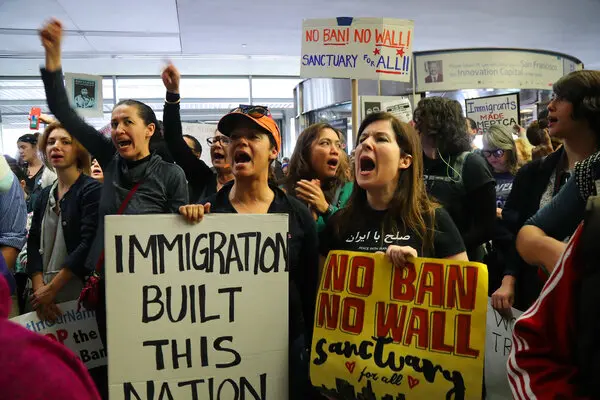WASHINGTON (BN24) — President Donald Trump’s sweeping travel ban targeting nationals from a dozen mostly African and Middle Eastern countries officially took effect at 12:01 a.m. ET Sunday, just hours after immigration-related protests in Los Angeles erupted into clashes with police.

Under a proclamation signed by Trump last week, nationals from 12 countries — Afghanistan, Myanmar, Chad, the Republic of Congo, Equatorial Guinea, Eritrea, Haiti, Iran, Libya, Somalia, Sudan, and Yemen — are now barred from entering the United States. The order also imposes increased restrictions on travelers from seven additional nations, including Burundi, Cuba, Laos, Sierra Leone, Togo, Turkmenistan, and Venezuela.
Trump defended the move, citing national security and immigration enforcement concerns. He said the countries on the list were chosen because of their “elevated risks of terrorism, public safety threats, and high rates of visa overstays.”
“Protecting the American people remains our highest priority,” Trump said in a statement from the White House. “We must be vigilant about who we allow into our country.”
The decision has drawn swift and widespread condemnation from civil rights organizations and humanitarian groups, who describe the expanded ban as discriminatory and harmful to vulnerable populations.
“This policy will separate families and shut the door on people fleeing war, political persecution, and humanitarian crises,” said Fatima Hassan, director of the Refugee Rights Coalition. “It disproportionately targets Black and Muslim-majority nations and undermines America’s global leadership in refugee protection.”
The travel restrictions come at a moment of intensifying immigration tensions across the country. Over the weekend, Los Angeles witnessed mass protests against recent federal immigration enforcement raids. Demonstrators clashed with police in downtown L.A., resulting in dozens of arrests and reports of looting near Union Station and the Roybal Federal Building.
The new policy echoes Trump’s earlier travel ban in 2017, which was upheld by the Supreme Court after legal challenges and similarly targeted Muslim-majority nations. This latest expansion is expected to face renewed court scrutiny in the coming weeks.



